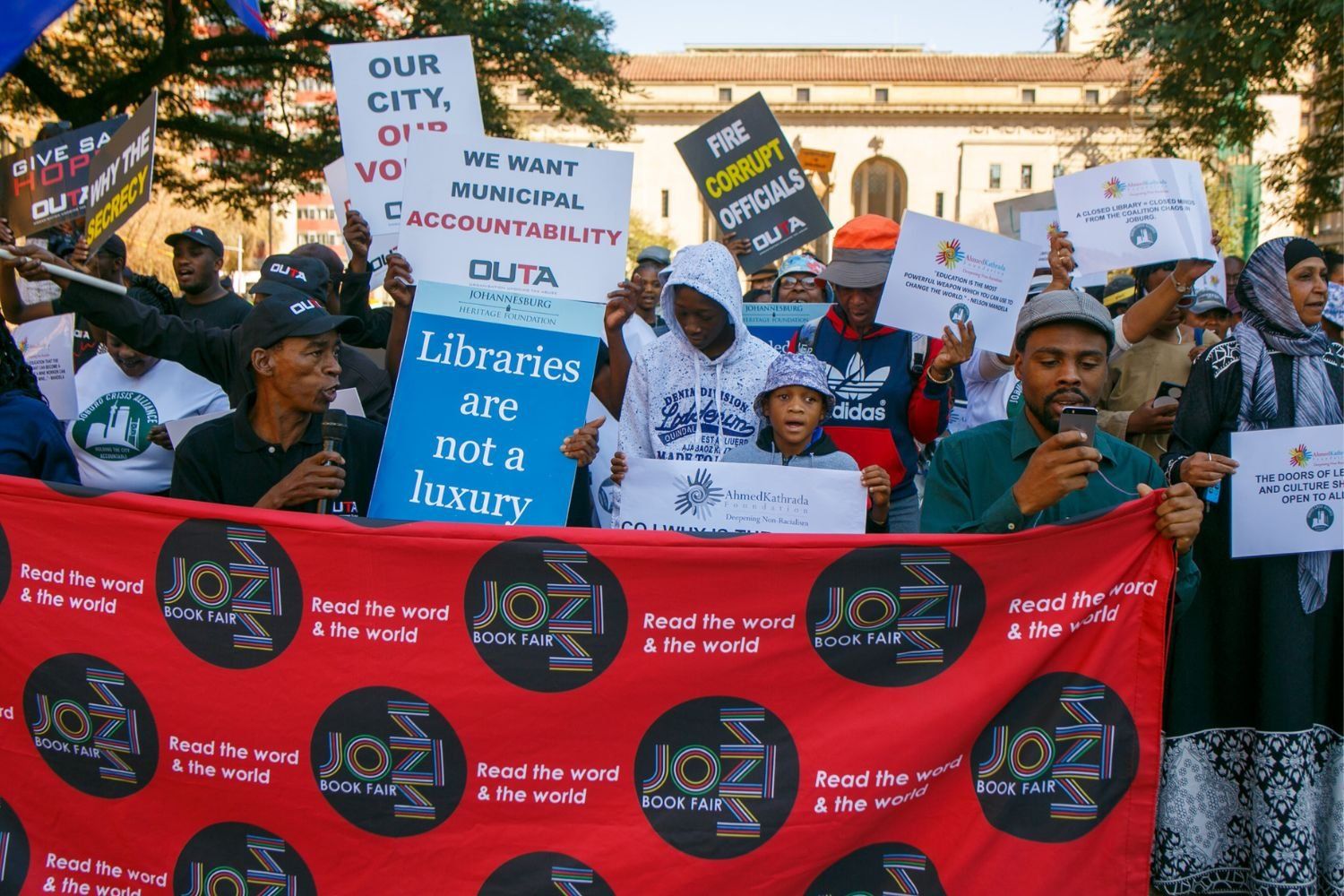A City's Fight to Reclaim Its Library
A determined 82-year-old activist and her community fought to reopen the Johannesburg City Library after five years of closure.
The Johannesburg City Library closed in 2020 during the COVID-19 pandemic, but unlike many public spaces it remained shut even after restrictions were lifted in 2021. City officials cited structural issues, including a leaking roof, as the reason for the delayed reopening.
In response, the community rallied to demand its reopening, and now it’s finally happening. The library partially reopened on March 21.
"I've been going to the library since I was three or four years old, so it means a lot to me," recalls 82-year-old Flo Bird about the 90-year-old library in the center of South Africa’s biggest city. "My dad used to work with the central library, and there was a museum upstairs, so we would go up. Sometime in my life, it was a place of refuge. And it was lovely!" Bird tells OkayAfrica.
Bird, who founded the Johannesburg Heritage Foundation (JHF) in 1985, is a passionate activist and well-known historian who has dedicated years to preserving her city's legacy. Bird has long championed the library’s revival, playing a key role in its reopening after five years of closure. City officials have promised the library will fully reopen to the public later this year.
Unmasking the closure
Bird was dismayed when she first learned about the library's extended closure. "The city library has material that nobody else has, and when we discovered it would remain closed after lockdown, we were horrified. We couldn't understand why. When we asked why, we were told the building was 'structurally unsound and wasn't safe for human habitation.'"
Skeptical of this explanation, Bird says, "We knew that was an overstatement." The JHF demanded and received permission to inspect the building. Accompanied by architects and engineers, they found no significant structural issues — only a water pressure problem.
Community impact
Before closing, the library served as a vital resource for residents of all ages. "We couldn't get the information anywhere else. There was no lending library for the children. There was no lending library for the adults. Many people live in this town; it's not that people don't live there."
The facility had provided 140 workstations with free internet access for students — a critical service for the community. Bird explains, "One of our employees was studying and coming in from miles away. He would go to the library to use the internet, as he didn't have access at home. This all stopped once the library closed, and he didn't finish his degree."
Taking action
With characteristic determination, Bird and the JHF joined forces with the Johannesburg Crisis Alliance for a well-publicized protest in May last year. Dozens of residents participated, demanding accountability from city officials. Their efforts led to monthly meetings between all involved groups, with progress updates on the repair work.
This cooperation made a huge difference in progress because it meant there were regular reports and kept everyone up to date. This accountability ultimately led to the partial reopening in March.
Photo by Yunus Chamda
Flo Bird is a passionate activist and well-known historian who has dedicated years to preserving her city's legacy.
A community united
Joburg residents care deeply about their city. Griffin Shea, owner of Bridge Books Store and founder of the Johannesburg Literary District, is another concerned resident making a difference. His initiative bookmarks 74 literary spaces within one kilometer of the library. They print neighborhood maps, create library awareness, adapt library gardens with city parks, redo flower beds, and add murals.
"We're building little outdoor libraries to try and steer people into the library because the signage is not great, and many people don't know that the library is public and that it's free and for everyone," Shea tells OkayAfrica. "The librarians want to see you, and they want to help you." He emphasizes that the city library hosts valuable free skills development programs that help people gain employment.
A turning point
Heritage architect Brian McKechnie tells OkayAfrica, "It's the responsibility of people like the mayor and the city of Johannesburg to care for the people who live in the central business district, and they don't do that." However, he acknowledges that the library project represents the first time the city had genuinely listened to interest groups, and a good partnership was finally developing between them.
For years, Johannesburg has been marred by infrastructural decay, either by corruption or mismanagement. Issues include damaged streets, potholes, broken traffic lights, water shedding, and a city power system on the brink of collapse. But McKechnie outlines the positivity behind the reopening "because it was organizations applying public pressure onto the city, saying, 'The library is a very important city resource, and it's a disgrace that you're not caring for it; it's a resource that so many citizens of Joburg need.'"
Bird emphasizes this crucial point: "The big point about the library is that it is free. We pay for that as Joburg ratepayers. It's our facility. As far as I know, the right to information is a human right. So we were very pleased that they opened the library."
The JHF isn't stopping with this victory. They're now focusing on the Johannesburg Art Gallery, which has been closed and in disrepair for years. "We'll just have to go on. We won on the library. We have to win on the gallery as well," Bird says.
What keeps this 82-year-old activist motivated through these challenges? "Well, the thing that keeps me going is my bad temper!" she laughs.
- Op-Ed: Why Backlash Against Chris Brown’s South African Tour Matters ›
- Afrikan Freedom Station Returns to Johannesburg's Cultural Scene with More Life ›
- Gas Explosion Kills One, Injures 48 in Downtown Johannesburg ›
